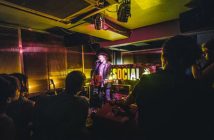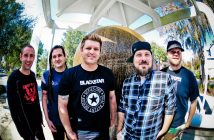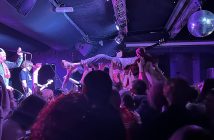Midge Ure is a man who needs no introduction. A pioneering force in the technological turn of the 80’s, Ure is best known for his work under Visage and Ultravox, not to mention his stint touring the world as part of Thin Lizzy whilst simultaneously recording the album that would become Vienna. Alongside Bob Geldof, Ure fronted the live/band aid movement, writing, recording and mixing the smash charity hit Do They Know It’s Christmas? before playing the event himself with Ultravox.
To celebrate his monumental career in music, Midge embarks on a UK tour this November, entitled Catalogue. Catalogue is shaping up to be the defining celebration of a man whose contribution to music has left very little unturned. Aptly talking to me through the powers of technology, of which he emerged at the forefront of all those years ago, I chatted with Midge about the upcoming tour as well as asking those all-important questions on his eclectic career in music.
This is the third successive tour celebrating parts of your career, after 1980 and Voice and Visions. How do you decide what to play on these tours? Catalogue obviously covers a wider spectrum. How do you condense that into a set?
It’s a three-pronged attack, I suppose. You have to please the audience, hence the hits. They’ll expect certain songs and I doubt I’ll be let out the building if I don’t play them. You’ve also got to understand that half the audience aren’t there to see you anyway – they’ve been dragged along by their other halves. So you have to appease them and not play too much they won’t understand. Then, you’ve got to please yourself. So just going on and playing stuff that I don’t resonate with won’t work, so you have to be selective about that also. Yes, it’s called ‘catalogue’ and it’s bound to cover a massive blank canvas for me so that gives me chance to delve outside of expectation, but there’s certainly some things I wouldn’t like to go back to. In my first commercially-successful band, Slik, I didn’t write any of it! So it isn’t me. I’m there, and I mimed to it on Top of the Pops, but it wasn’t mine. Nothing was mine until after that. I might look into doing stuff from my time in The Rich Kids (fronted by Glen Matlock of Sex Pistols) and maybe even a Thin Lizzy cover because of my association there. It’s all up in the air right now but I’ve got plenty of time to figure it out!
Do you tend to stick close to the original style, or is there room to experiment and shake it up on stage?
I think that there’s an essence of disappointment when you shake them up too much and it takes the audience five minutes to even figure out the song. I’ve seen artists do that and it’s disappointed me. There’s an element of wanting to hear what you know and recognise, but you can do that without replicating. Prior to touring, I spend ages working on the sounds we are going to use in the shows. The synths, drums, all that stuff. But you don’t have to copy them note for note – I don’t want to be a human jukebox. I remember seeing The Eagles in Glasgow when I was a kid. They sounded just like the record, which was great, but it was like watching paint dry. It was so static – nothing there except brilliant musicianship. There needs to be a balance. Creating the recognisable essence, without going note for note, does that for me. I don’t want to be my own cover band.
Looking back over your career, do you consider your work to be directly relational to your life at the time? For example, my favourite album of yours, Answers To Nothing [insert fangirl moment where I hold up my own battered copy]definitely shows this. You’ve blown conventional music out of the water with Vienna, you’ve engineered Live Aid, and I can feel that in the record. Do you think life and music are one?
Very much so. That was the point of Answers, because I don’t have them! I have my opinions. There’s an element of stepping outside the security of your band and saying okay, ‘you’ are responsible for this, not ‘we’. Yeah, you have a band there to help you, but those were my feelings and my own thoughts and that’s a scary thing. Kind of like starting over again. I’ve always seen music as a diary. It does reflect what you go through and what you experience. It’s very personal but someone somewhere will be listening and get exactly what I’m saying or will interpret it to suit their own experience. It isn’t my job to correct them, but it’s about my own trauma and experience and making it adaptable to someone else. People ‘getting it’ (his emphasis) is my benchmark – I’ve got to be happy knowing someone else will be. I can’t make music that aims for success- only to be self-satisfying. It’s a very selfish thing. If it’s commercially successful, that’s down to someone else’s hard work, not mine! I’m not going down to the radio stations and asking them to play it, nor do I turn up at your house and ask you to buy it. My job is done the moment the music hits the shelves.
Keeping to that record in particular quickly, I read that you described Kate Bush’s contribution to the song Sister and Brother as having added her ‘Kate-isms’. Do you think you have the same impact on the music you work on? ‘Ure-isms’, if you will?
I hadn’t actually thought of it like that. I suppose that you develop a personal style. Love it or loathe it, I can’t really shake it off. It just comes from me. If I try and alter it, I might as well sing in an American accent or a different language – it’s not natural. So I suppose if I do work for someone else, it has to have an essence of me. I’ve read reviews of things I’ve done and to me it still sounds exactly like the artist, but people still compare it to Ultravox. People come to me to produce for them because they like what I do. If you want me to play guitar for your track I’ll do it, but naturally that’s going to sound like me. Because it is my particular weird style. That style comes to all of us, because that’s how we are. We are who we are because of what we read, the teachers we had, our upbringing, the music passed to us. That becomes you, which makes you different to your mate. It’s the same for music. My style is honed from listening to music as a kid, taking the atmosphere that created, listening to other guitars. I’ve picked these things up and then it becomes mine. Not copying, just influenced by.
I’ve mentioned Kate Bush as just one of your collaborators over the years. Is there anyone you didn’t work with that you wish you had?
The one that’s missing from my weird repertoire is John Lennon. I’m not sure how that would have gone – our characters seem totally different. I’m more easy going! I worked with the other three Beatles in various forms and that was great because when I was a kid they were the biggest band ever. They changed everything whether you were a fan or not. They changed recording, the processes, they broke the rules and the mould. I haven’t turned anything down per se. I’d have loved to have spent more time on stage with Bowie playing guitar, but it wasn’t to be. I had my 15 minutes!
This is what I love about your career. Everything you’ve thrown at the wall has seemingly stuck. You even managed to nearly push Thin Lizzy to synths! Is there a stone you feel is unturned for you? Is there a direction left to explore?
I’ve never had a map to tell me where to go. It’s instinctive. I bought a synthesiser in ’78, brought it into The Rich Kids and immediately killed the band. But from that grew Visage and Ultravox, and other productions, so it’s a route that just unfolds. Right now I’m not sat here thinking about what’s left to do before I pop my clogs. Another album is on the way, and it has been for 10 years now, but it will get there and it will be and sound like a Midge Ure album. But it’ll be grown up. A different process entirely. I’m impacted by different things now than I was before. It’ll be what it’ll be. I don’t have a hit list of people left to work with, but if it happens it’s bound to happen organically. I’ve been like that my whole life.
It goes without saying that Ultravox were a huge part of that technical turn in music history. How do you think modern technology impacts music? More specifically, the use of AI (Artificial Intelligence) and its contribution to music production?
It’s scary. Most artists are quite precious about what they’ve done. Not the content, but the sentiment. How it unfolds and who has access. My kids did it – they asked AI to write a song in the style of Ultravox and it came up with something incredibly cheesy. It could’ve been accurate, I’m not sure, I’m not the person to say! But the idea that once you’re gone and left a legacy that it can be destroyed by it is scary. All of a sudden you’re singing about giraffes and lollipops or whatever, that you’d have never done, it’s scary. You were the taste master, the filter, and all of a sudden that’s lifted, and you can somehow carry on without it. The idea that there could be an Ultravox in 40-50 years from now is terrifying! Writing stuff we never would have dreamed. I suppose that it’s always been like that, though. There’s a point where you draw a line under what you’re doing, and then everything else is down to everyone else. There’s no control. Only what you do – not its perception.
Who are your favourite current artists? After watching you cover Harry Styles on BBC Radio 2 it got me thinking about what inspires you these days. Is it the same as what always has?
It’s the same, but grown up. I did a stint on Scala Radio a year or so back where I took over a late night programme. They don’t usually have a host, it’s a quasi-classical station, but they asked me to and I started uncovering this amazing music. Neo-classical composers, like Max Richter or Sigur Ros. This beautiful, textural, melodic music. I’ve fallen in love with that. I’ve always loved and made instrumental music. So that’s what’s always inspired me. I’ve actually just finished an entirely instrumental record. I’m trying to find a home for it. If I give it to my label they’ll say ‘okay, where’s the single?’. There isn’t one! So I have to find the right vehicle to get it out there. Every time I hear something that resonates, I dash to turn the stereo up.
I would definitely be murdered if I didn’t ask you about your role in Band/Live Aid… How was it to go out there on the day and perform with the knowledge of your contribution to the project?
I don’t think it crossed my mind at the time because I was so petrified. Something about walking out in front of thousands and millions of people I’d imagine. The 100,000 stood in front of you was enough, let alone when the Americans kicked in on TV later in the day. Fortunately we were on and off before they had the chance! All I concentrated on were the people at the front. There was no soundcheck and at that time Ultravox were doing 5 hour soundchecks because of all of the technology we were using. I just hoped I sung in tune because I couldn’t really hear what I was doing. It was 18 minutes – we were off before we even managed to enjoy ourselves. The buildup was immense; the aftermath was a burst bubble. It’s like building up to Christmas as a kid and then having to wait another year to do it all over again. Scary, but satisfying.
It obviously had this precedent in which it showed that music did have a purpose. It could change the world, to be conventional. Recently there’s been a surge in these types of events, charity pioneers like War Child doing similar things. Why do you think that nothing has ever matched the scale of Live Aid?
I think there’s a variety of reasons. Technology is one of them. We have a situation today which is an absolute mess. Music isn’t the be-all and end-all like it was then. We didn’t have the distraction of the internet and smartphones. Music still had power, more than it does today. Every generation we re-do Do They Know It’s Christmas? and it’s a real problem we notice. Music just doesn’t have the clout it used to. So maybe that’s the answer. Music isn’t consumed in the same way – you seldom buy it, you can’t generate income from it how you used to. There’s only so many places you can push these things. Right now, The Live Aid Story is in a theatre in London. And that will generate income for the cause. But I don’t think global concerts have the same pulling power as they did back then. We were at the halcyon of that process.
In almost everything I read of yours, you always seem to be starstruck by the musicians you surround yourself with. Clapton and Bowie spring to mind as two examples you’ve used. Where do you feel your legacy sits within that?
I think it’s just got to be for doing what I did, and currently do. Not succumbing to pressure or adapting. For example, I avoided DJ remixes like the plague. I’ve not spent my life in music maintaining my own standard to have to fight against that and let someone throw a clashing synth-bass right across my melodies that doesn’t fit the chords. Sticking to your guns, because you believe it’s right. This was just a hobby that I just so happened to make a living from. I’ve been so fortunate.
I just want to round back to the new tour again. You mentioned earlier about the possibility of throwing a Thin Lizzy track in there. How would that work?
Well I’ve only got one guitarist so it could get interesting! That’s a double guitar thing so I’m not sure. I definitely want to do a Rich Kids tune as well because its one of the first things I had done that I loved. I’m just forming ideas right now. Phillip Lynott wrote a lot of good songs – if my audience knows them is another question. But I’ve loved them from the time I saw them as a three piece in Glasgow all those years ago so it would be great to add that in as part of my umbrella. We’re just going to have to wait and see!
Midge embarks on a brand new tour of the UK, starting November 15th at Bournemouth’s Pavilion, in celebration of his life in music. Tickets can be purchased here.

![Midge Ure on Legacy, Live Aid, and his upcoming ‘Catalogue’ tour: ‘The idea that there could be an [AI] Ultravox in 40/50 years from now is terrifying’](https://theedgesusu.co.uk/wp-content/uploads/2024/03/download-610x336.jpg)


